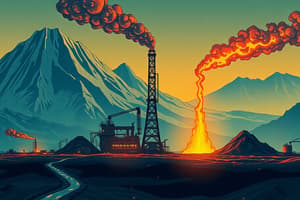Podcast
Questions and Answers
How are coal and petroleum formed?
How are coal and petroleum formed?
- Through high-pressure volcanic activity
- As a result of recent human activities
- By direct extraction from the atmosphere
- From the decomposition of ancient plants and animals over millions of years (correct)
Which of the following statements is true about coal formation?
Which of the following statements is true about coal formation?
- Results from direct precipitation in oceans
- Is a recent human invention
- Originates from the accumulation of vegetation in swampy environments (correct)
- Forms from volcanic eruptions
What is the primary use of coal?
What is the primary use of coal?
- Transportation fuel
- Primary feedstock for manufacturing plastics
- Electricity generation and industrial applications (correct)
- Heating homes exclusively
In what way is petroleum important for modern life?
In what way is petroleum important for modern life?
Which geological process is involved in the formation of coal and petroleum?
Which geological process is involved in the formation of coal and petroleum?
What role do fossil fuels play in modern society?
What role do fossil fuels play in modern society?
How is coal primarily extracted from the earth?
How is coal primarily extracted from the earth?
What method is commonly used to obtain petroleum?
What method is commonly used to obtain petroleum?
Which environmental consequence is associated with coal processing?
Which environmental consequence is associated with coal processing?
What is the main environmental impact of burning both coal and petroleum?
What is the main environmental impact of burning both coal and petroleum?
How does natural gas rise to the surface during extraction?
How does natural gas rise to the surface during extraction?
What distinguishes coal processing from petroleum processing?
What distinguishes coal processing from petroleum processing?
Flashcards are hidden until you start studying
Study Notes
Coal and Petroleum: A Comprehensive Overview
Throughout history, human civilization has relied on a pair of fossil fuels to power its growth and progress: coal and petroleum. Understanding their formation, uses, extraction, processing, and environmental impact is crucial to appreciating their significance and potential for shaping our future.
Formation
Coal and petroleum are both formed from the remains of ancient plants and animals, which have undergone millions of years of geological processes. Coal originates from the accumulation of vegetation in swampy environments, followed by pressure and heat from overlying rock layers. Petroleum, on the other hand, forms from the decomposition of organic matter buried in sedimentary rock layers, deep underground. Both coal and petroleum are ultimately transformed into solid, liquid, or gaseous states through a process called diagenesis, which involves chemical and physical changes over long periods of time.
Uses
Fossil fuels are the primary sources of global energy. Coal is mainly used for electricity generation, industrial applications like steel production, and heating. Petroleum is vital for transportation, electricity generation, heating, and various industrial processes, as it is the primary feedstock for the manufacture of plastics, fertilizers, and numerous other chemical products. Both fossil fuels serve a wide range of essential functions in modern life.
Extraction
Coal is extracted from the earth through underground mining (also known as deep mining), which involves removing coal from beneath the surface, or surface mining, which involves removing coal from the surface layer. Petroleum is obtained through drilling, and the extracted oil is then pumped to the surface using pumps and other equipment. Natural gas, which is often found alongside petroleum, is extracted through drilling, and it rises to the surface due to its lower density.
Processing
Petroleum processing typically involves fractional distillation, in which crude oil is heated and separated into its constituent components based on their boiling points. These components are then used to produce various petroleum products, such as gasoline, diesel, jet fuel, and lubricants. In contrast, coal processing generally involves washing the coal to remove impurities, followed by grinding and drying to prepare it for use. Coal processing is less common than petroleum, as coal is often burned in its raw form.
Environmental Impact
The use of coal and petroleum has significant environmental consequences, both during extraction and combustion. During extraction, coal mining can result in deforestation, soil erosion, and water pollution, while petroleum extraction can lead to water contamination, air pollution, and habitat destruction. Both fossil fuels contribute to greenhouse gas emissions, primarily carbon dioxide, when burned, and their use is a major factor in climate change.
To mitigate these impacts, governments and industries are exploring alternative energy sources and technologies, such as renewable energy, carbon capture and storage, and clean coal technologies. The future of coal and petroleum will likely involve the judicious use of these resources, balanced with efforts to reduce their environmental footprint and transition to more sustainable energy sources.
Studying That Suits You
Use AI to generate personalized quizzes and flashcards to suit your learning preferences.




